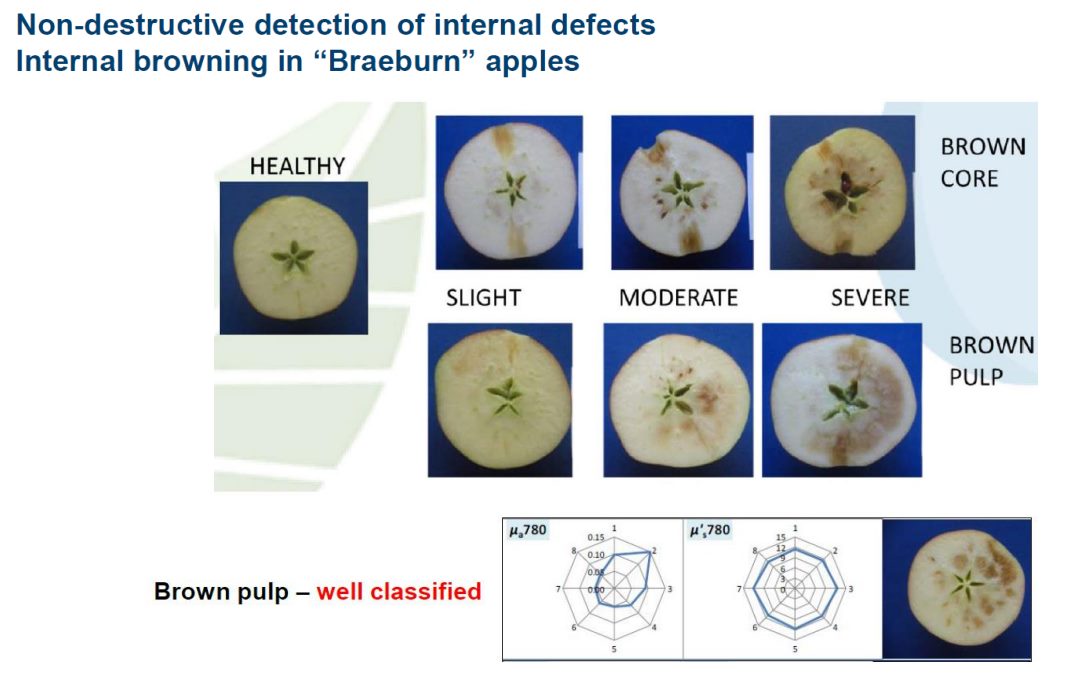Summary
- Profile Type
- Technology offer
- POD Reference
- TOIT20230308038
- Term of Validity
- 22 March 2023 - 21 March 2025
- Company's Country
- Italy
- Type of partnership
- Commercial agreement with technical assistance
- Research and development cooperation agreement
- Targeted Countries
- All countries
Contact the EEN partner nearest to you for more information.
Find my local partner
General information
- Short Summary
- An Italian spin-off company of Politecnico di Milano developed the next-generation devices for Time-Domain Near-infrared Spectroscopy (TD-NIRS), whose applications include non-destructive exploration of internal properties of any biological tissue, like agri-food products, independently on the status/color of the outside peel. The company is looking for new partners interested in Commercial agreement with technical assistance or Research and development cooperation agreement.
- Full Description
-
The Start-up company is a university spin-off from Politecnico di Milano, Italy.
The company products are based on Time Domain Near Infrared Spectroscopy technique empowered by self developed and compact photonic technology. TD-NIRS can be successfully used to non-destructively explore internal properties of any biological tissue, like agri-food products, independently on the status and color of the outside peel.
Optical measurement results can be correlated with conventional agri-tech quality parameters (firmness, total soluble solids, acidity) and also detection of internal defects. Development of fruit and canopy sensors, based on innovative photonic technologies, will enable a reliable and non-destructive evaluation of crop quality, directly in the field. This will become of outmost importance for assessing the optimal harvest time, thus supporting new models for efficient use of resources, effective processing of final products and waste reduction, in the direction of fostering precision agriculture.
This technology was (and currently is) tested and validated in several research projects involving universities and research institutions, both in Italy and Europe.
The company is looking for long term partnership with bigger companies to develop further its technology in the agri-tech industry and collaboration with end users and university for research and development projects. Partnership can be established as commercial agreement with technical assistance with companies, whereas research and development cooperation agreement will be established mainly with universities or and users of the technology. - Advantages and Innovations
-
Time domain near-infrared spectroscopy (NIRS) exploits point-contact measurements in reflection configuration (injecting and collecting laser light signal from the same side of the fruit); the measurements provide an estimation of the regional optical parameters at a penetration depth of approximately 1-2 cm from the surface.
The main advantages are related to:
Non-destructive optical characterization of internal optical properties and correlation with quality parameters:
- Basic studies in apples, nectarines, tomatoes, …
- Changes in optical properties during growth in Elstar apples and Tophit plums
- Texture in Jonagored apples, Braeburn apples and Pink Lady apples during storage
Non-destructive assessment of fruit maturity at harvest and correlation with quality parameters:
- Basic studies in apples, kiwifruits, nectarines, peaches, mangoes, …
- Sensory attributes, aroma composition, ethylene production Ambra nectarines
- Softening prediction (based on biological age) in Spring Belle nectarines and in Tommy Atkins mangoes
Non-destructive detectio of internal disorders and defects
- Browning in Granny Smith apples, Braeburn apples and Conference pears
- Watercore in Fuji apples
- Mealiness in Braeburn apples and Jonagored apples
- Chilling injuries in Jubileum plums and Morsiani 90 nectarines - Stage of Development
- Already on the market
- Sustainable Development Goals
- Goal 2: Zero Hunger
- Goal 12: Responsible Consumption and Production
- Goal 13: Climate Action
- Goal 17: Partnerships to achieve the Goal
- Goal 11: Sustainable Cities and Communities
- IPR status
- IPR granted
Partner Sought
- Expected Role of a Partner
-
- Big Companies:
long term collaboration and investment in the company to take proprietary technology in the industry marked.
- R&D Institution and Universities:
User / tester of the novel technology; Support in the research and development of the internal cutting edge research project of the company. Collaboration and partnership in national and international research project. - Type and Size of Partner
- Big company
- University
- R&D Institution
- Type of partnership
- Commercial agreement with technical assistance
- Research and development cooperation agreement
Dissemination
- Technology keywords
- 08002001 - Detection and Analysis methods
- 09003 - Electronic measurement systems
- 08002002 - Food Microbiology / Toxicology / Quality Control
- Market keywords
- 03007003 - Other analytical and scientific instrumentation
- 03007002 - Other measuring devices
- 03007001 - Chromatographs and related laboratory equipment
- Sector Groups Involved
- Agri-Food
- Targeted countries
- All countries

